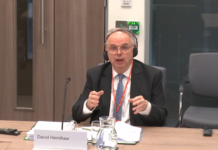On a visit to Wales, Economic Secretary to the Treasury, Harriett Baldwin sets out how a vote to remain in the EU will protect financial services jobs and promote economic growth.
On a trip to North Wales today the Economic Secretary to the Treasury, Harriett Baldwin, will set out how a vote to remain in the EU will protect financial services jobs, promote economic growth and ensure that the next generation of Welsh finance graduates are given the opportunities to succeed.
The Economic Secretary will dispel the myth that leaving the EU would simply be a problem for the City in London and that the wider UK financial sector and that places like Bangor and Wrexham would not be affected.
Joined on the trip by Guto Bebb, Parliamentary Under-Secretary of State for Wales, Harriett Baldwin will highlight the importance for staying in the EU to a sector that plays a crucial role in Wales’ economy. The financial sector added £2 billion to the Welsh economy in 2014. The industry supports over 50,000 jobs in Wales, with 33,000 people in Wales working directly in financial and insurance services and another 24,000 working in associated professional services. TheCityUK estimate that 25,000 students in Wales are currently enrolled in courses connected to the industry.
Wales is an emerging force within the financial sector, increasingly host to the businesses and services which underpin the UK’s world-leading financial industry.
Professional services firms such as Deloitte and PwC have set up significant operations in Wales and global financial firms such as Admiral (a FTSE 100 company), GoCompare.com and the Principality Building Society, have all chosen to proudly call Wales home.
Being a member of the EU has meant that the UK has full access to the single market- a market of over 500 million customers and an economy over five times bigger than the UK’s.
In financial services, access to the single market helped the UK sector to export over £22 billion of financial and insurance services to the EU in 2014. This is around 33% of the UK’s total financial services exports.
New Treasury analysis shows 285,000 jobs across the UK are linked to financial services exports to the EU. 100,000 financial services jobs are directly linked to these exports, and a further 185,000 jobs are linked to the indirect demand generated in the wider economy as a result of financial services exports to the EU.
Leaving the EU would put tens of thousands of these jobs at risk across the UK.
Around half the world’s largest financial firms have chosen to base their European headquarters in the UK. In 2014, the amount of investment in the UK’s financial services sector, by companies based across the world reached £280 billion – 17% of this was from the EU.
Across all sectors of the economy, almost three quarters of foreign direct investors said the UK’s access to the EU market was an important factor behind the attractiveness of the UK as a destination for investment.
The single market also means that financial services has access to ‘passporting rights’. This financial services passport allows a financial services firm that runs out of the UK to set-up a branch of their firm in another EU country, or sell their services to another EU country on the basis that they’re authorised to do so (and regulated) by the UK.
Companies that don’t have access to the EU Single Market, like Switzerland and the USA set-up subsidiaries in the UK, so that they can get a passport.
The Economic Secretary to the Treasury, Harriett Baldwin, said:
This country faces a fundamental choice – whether to remain a member of a reformed EU, or to take a leap into the dark.
The financial services industry in Wales continues to grow with 33,000 people employed in financial services and a further 24,000 working in associated professional services.
A vote to stay will protect these jobs and promote further economic growth across the whole of Wales.
Given the huge impact that a vote to leave in the EU referendum will have on the opportunities available for the next generation of finance and business students, the Economic Secretary has chosen to visit Bangor University. Here she will take part in a discussion with students and local business representatives on the economic benefits of EU membership.
She will also talk to representatives from Wrexham Glyndŵr University and students from Coleg Cambria to get their views on the forthcoming referendum and discuss how the vote on the 23rd June will shape the future opportunities available to them.
The Economic Secretary, Harriett Baldwin, said:
Remaining in the EU will ensure that the next generation are given the opportunities they need to succeed and pursue successful careers in business or finance.
If we were to leave the EU, our economy would be smaller, there would be fewer financial services jobs and fewer opportunities available for the 25,000 students in Wales that TheCityUK estimate are studying on courses connected to the industry.
Without unrestricted access to the EU and the 500 million customers it contains, budding entrepreneurs will face tougher struggles than before. The ability of their businesses to flourish and grow significantly in the future will be put at risk.
Students have real power to shape the future of our country and to be the decisive voice in this referendum. Let’s not put their futures at risk on the 23rd June.
Parliamentary Under-Secretary of State for Wales, Guto Bebb, said:
The economy in North Wales continues to grow at a healthy pace, with the financial services sector developing very quickly. It is difficult to overstate the importance of staying in the EU for this industry and the higher education sector in North Wales. Both sectors depend upon strong and constructive relationships with partners across the European Union.
Universities and businesses, whether established or ambitious start-ups are creating highly skilled and well paid jobs across Wales. This is particularly true of the financial services sector. Staying in a reformed EU is key to seeing further developments of a burgeoning sector that is transforming employment and business opportunities across Wales.
The Economic Secretary will also visit The Depository Trust & Clearing Corporation (DTCC), a global financial services technology company, which employs over 750 people in the UK and has become one of the largest employers in North Wales. Last year, the firm’s subsidiaries processed securities transactions at over $1.5 quadrillion. Here she will deliver a major speech on the importance of remaining in the EU for financial services to an audience of over 500 Wrexham employees.
Help keep news FREE for our readers
Supporting your local community newspaper/online news outlet is crucial now more than ever. If you believe in independent journalism, then consider making a valuable contribution by making a one-time or monthly donation. We operate in rural areas where providing unbiased news can be challenging. Read More About Supporting The West Wales Chronicle


























